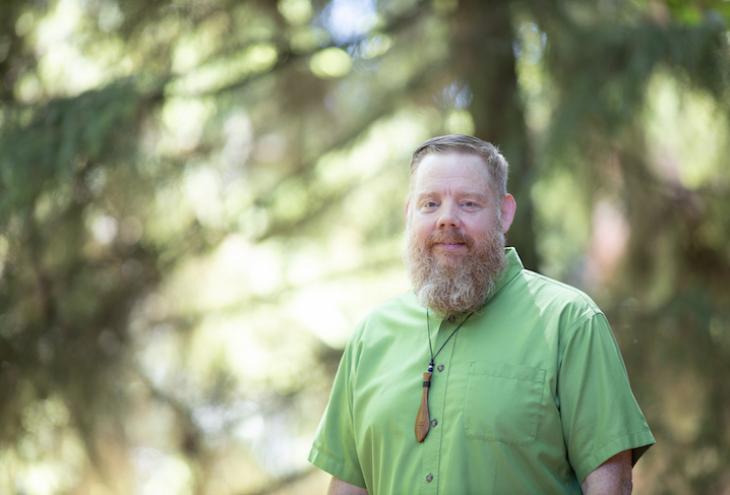By the age of six Joseph Peters had spent countless hours on his father’s salmon fishing boat and knew he was meant to follow in the footsteps of his ancestors. Members of his Squaxin Island Tribe are descendants of people who for millennia lived on the shores and watersheds of Puget Sound, and Peters wants to continue the family tradition of working on and with the water. Having recently graduated with a master’s degree in natural resources, Peters feels more prepared than ever to help his tribe in the conservation and sustainable management of their land and water.
Growing up on the west side of Olympia, Wash., Peters and his family — his mother, father, and two younger brothers — lived right on the water. “I had the southernmost inlet of Puget Sound as my backyard,” says Peters. Because they also lived just a 10-minute drive from the Squaxin Island Indian Reservation, Peters found himself living in close proximity to his grandparents, aunts, uncles, and cousins. Peters consistently drew on the support of his family to pursue an education and his dreams. One second cousin took an especially strong interest in Peters and his studies. “My second cousin, Roger, has a PhD and is a biologist for the U.S. Fish and Wildlife Service,” says Peters. “I received a lot of support and encouragement from him, and Roger has always been a person I’ve looked up to as a role model in the field.”
With such strong support, it was no surprise that by high school Peters was set on working in natural resources for his tribe, and knew exactly how he was going to get there. “I focused on a high school curriculum to prepare me for college,” he says, “taking the needed math and science courses.” Peters also engaged in extracurriculars that would help him achieve his goals: “In Boy Scouts and high school sports I learned how to be goal oriented and build the leadership skills I needed to be successful.” His dedication and perseverance paid off, as he went on to earn his bachelor’s in environmental science at Evergreen State University.
About a year before graduating, Peters began working for his tribe as a fisheries technician. A year later, he was promoted to fish biologist/harvest manager. More recently, he was promoted to the role of natural resources policy representative. With this new role, Peters knew the timing was right for him to pursue an advanced degree, something he had always wanted to do but hadn’t been able to afford. “I didn’t want to take out large loans to attend grad school,” says Peters. But his prospects changed about three years ago when his tribe began providing funding for grad school.
With this funding, Peters was able to enroll in a fully online master’s program at Oregon State University. “This online program allowed me to keep my job and not be uprooted,” says Peters. “I was able to stay home and be with my family, and to participate in my treaty rights of fishing and hunting.”
But graduate school wasn’t without its challenges. “The largest challenge for me was balancing work, family, and school,” says Peters. He found it difficult to manage class work without feeling guilty about shortchanging family time, and vice versa. “It took me about a year to find that balance,” says Peters, “but still stress and anxiety presented themselves throughout my studies.”
While Peters continued to lean on his immediate family for strength and support, he also connected with other Native students around the country who were pursuing his program. Peters found that those students could relate to the issues he and his tribe were dealing with, but he knows that it was really the support of his family that got him through tough times. “Coming from a supportive family has been a major part of my success,” says Peters. “My wife and my kids are my largest supporters, and I had overwhelming support from my siblings and parents.”
In June 2019, Peters graduated from Oregon State University with a master’s in natural resources and a certificate in fisheries management. He is excited to continue his work as the natural resources policy representative for the Squaxin Island Tribe, and doesn’t plan on stopping anytime soon. “One day I would love to be the director,” says Peters. “I believe I have a responsibility as a tribal member to work for my tribe to sustainably manage and protect our natural resources.”
Peters tells his story to encourage others to pursue their own goals. “I hope that what I have done academically inspires our youth that they too can get a college education and pursue their dreams,” he says. When times get tough or Peters needs a little extra motivation, he recalls what his late friend and tribal leader Billy Frank Jr. used to tell him: “Stay the course, tell your truth, and tell your story.” Peters has done all three.











